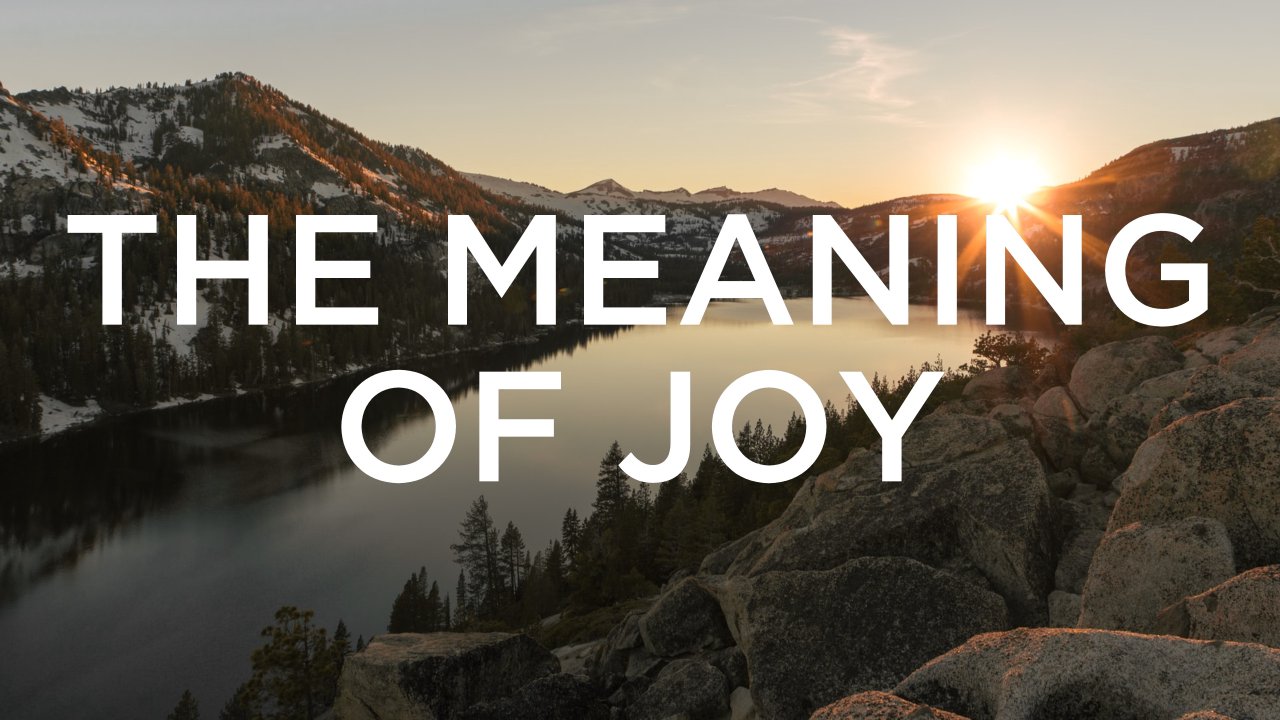INTRODUCTION
When Paul comes to describe the fruit of the Spirit in Gal. 5:22, he uses the singular form of fruit, and then goes on to list love, joy, peace, and so on. So instead of considering this as a list of disparate fruits, like apples, oranges and bananas, perhaps we might consider the different graces listed as aspects or attributes of the one fruit of the Spirit’s presence—like redness, sweetness, and so on. And one of the most distinctive aspects of His presence is the grace of joy.
THE TEXT
“Wherefore seeing we also are compassed about with so great a cloud of witnesses, let us lay aside every weight, and the sin which doth so easily beset us, and let us run with patience the race that is set before us, Looking unto Jesus the author and finisher of our faith; who for the joy that was set before him endured the cross, despising the shame, and is set down at the right hand of the throne of God. For consider him that endured such contradiction of sinners against himself, lest ye be wearied and faint in your minds” (Heb. 12:1–3).
SUMMARY OF THE TEXT
In the eleventh chapter of Hebrews, we were given a long list of Old Testament saints who had endured great trials and troubles (Heb. 11:35b-38), or who had overcome great trials and troubles (Heb. 11:32-35a). These all were set before us as examples to encourage us in the race that we have to run. The stadium is filled with saints from the older covenant, whose races are now complete, and it is our turn to come to the starting line (v. 1). We are to lay aside everything that might hinder us in running, whether a weight or a sin, and we are to run with endurance. That means this is therefore not a sprint, but rather a long race (v. 1). Although chapter 11 is crammed with examples, now that we are running, we are to look to the supreme example, Jesus—the author and finisher of our faith (v. 2). Jesus ran His race this way—He endured the cross, holding the shame of it in contempt, and is now seated on the throne of glory. He also has completed His race. This passage tells us to look to Jesus Christ twice—looking unto Jesus (v. 2), and consider Him that endured (v. 3). If we don’t consider how Christ endured such “contradiction of sinners,” we are going to get sucked down into our own pain, and then we will quit from exhaustion.
ROBBED OF JOY
Our text says that in order to run the race effectively, the race that has joy at the end of it, we must lay aside sin and the weight that so easily entangles. One of the things that robs us of our ability to run with joy toward that joy is sin. This was certainly David’s experience. “For day and night thy hand was heavy upon me: My moisture is turned into the drought of summer. Selah. I acknowledged my sin unto thee, and mine iniquity have I not hid. I said, I will confess my transgressions unto the Lord; And thou forgavest the iniquity of my sin. Selah” (Psalm 32:4–5).
A second major thief of joy is poor doctrine. Some people believe that because Reformed folk believe in total depravity that this means that we must spend our time wallowing around in it. But we affirm total depravity, which is not the same thing as blowing bubbles in it. False teaching, misplaced teaching, is a thief of joy. “What has happened to all your joy? I can testify that, if you could have done so, you would have torn out your eyes and given them to me. Have I now become your enemy by telling you the truth?” (Gal. 4:15-16)
NOT A HAPPY HAPPY JOY JOY THING
Joy is deep satisfaction with the will of God for your life, as that will is expressed by Him in the circumstances of your life. But joy is not froth and bubble on the surface of your life. Joy is the bedrock, down beneath the soil in which all your experiences grow. And the bedrock doesn’t move, regardless of what’s happening up above.
“But in all things approving ourselves as the ministers of God, in much patience, in afflictions, in necessities, in distresses, In stripes, in imprisonments, in tumults, in labours, in watchings, in fastings; By pureness, by knowledge, by longsuffering, by kindness, by the Holy Ghost, by love unfeigned, By the word of truth, by the power of God, by the armour of righteousness on the right hand and on the left, By honour and dishonour, by evil report and good report: as deceivers, and yet true; As unknown, and yet well known; as dying, and, behold, we live; as chastened, and not killed; As sorrowful, yet alway rejoicing; as poor, yet making many rich; as having nothing, and yet possessing all things” (2 Cor. 6:4–10).
Peter gives us the same kind of clear juxtaposition.
“Wherein ye greatly rejoice, though now for a season, if need be, ye are in heaviness through manifold temptations: That the trial of your faith, being much more precious than of gold that perisheth, though it be tried with fire, might be found unto praise and honour and glory at the appearing of Jesus Christ: Whom having not seen, ye love; in whom, though now ye see him not, yet believing, ye rejoice with joy unspeakable and full of glory: Receiving the end of your faith, even the salvation of your souls.” (1 Peter 1:6–9).
THE NOISE OF OUR CELEBRATION
One greater than Solomon is here (Matt. 12:42), and when Solomon was crowned king, Joab was provoked to ask, “Wherefore is this noise of the city being in an uproar?” (1 Kings 1:41). Solomon had been crowned in Gihon, and everybody came up from there “rejoicing” (1 Kings 1:45).
Christ was crowned at His ascension and given universal authority, and we are the people who meet weekly to acclaim Him as our king. That is what we are doing here, is it not? And that is why the hallmark of evangelical, Reformed, postmillennial, Kuyperian, covenantal faith is also here. What is that mark? Is it not cheerfulness? Is it not joy?

The Meaning of Joy
November 7, 2021 • Douglas Wilson • Hebrews 12:1–3
Our Gibbeted Christ (Good Friday)
March 29, 2024 • Douglas Wilson
This evening we have gathered to commemorate the crucifixion of our Lord Jesus Christ, the one who was sent into the world in order to die. And He was sent in order to die so that by that death, He might strike these chains off our wrists. In order to understand this, we have to come to grips with the fact that the death of Jesus was a vicarious, substitutionary death. He became the propitiation for our sins, as the Scripture repeatedly declares. All of this means that all the consequences of our rebellion—including fear, guilt, and shame—were poured out over Him. These burdens were laid across His shoulders so that He might die with them there, carry them all to the depths of Hades with Him, and then to come back from the dead without them. That is the message. That is why the death of Christ is such good news.
The Resurrection of the World
March 31, 2024 • Douglas Wilson • Romans 8:11, Romans 8:18–23
Two thousand years ago, a man who had been wickedly betrayed by the religious authorities, murderously crucified by the Roman civil authorities, did the unthinkable by rising from the dead. This was God’s plan from the beginning, and the Lord Jesus knew that this was the plan. “Therefore doth my Father love me, because I lay down my life, that I might take it again. No man taketh it from me, but I lay it down of myself. I have power to lay it down, and I have power to take it again. This commandment have I received of my Father” (John 10:17–18). And when Jesus took up His life again, He was taking up absolute dominion. A man who dies and comes back to life again in history is the Lord of history. And this has enormous ramifications.
Stand Still and See His Salvation (Palm Sunday 2024)
March 24, 2024 • Douglas Wilson • 2 Chronicles 20:17, Exodus 14:13
One of the things that happened in the medieval period was that the church calendar began to get cluttered up with numerous saints’ days and celebrations, like so many barnacles on the ark that was the church. There were many blessings that resulted from the great Reformation, and one of them was that the number of Christian holidays was pared down to what came to be known as the “five evangelical feast days.” All of them were geared to the life of Christ—Christmas, Good Friday, Easter, Ascension, and Pentecost. It is our practice here at Christ Church to have all of our celebrations of these days land on Sunday, with two exceptions. In addition to our 52 Lord’s Day celebrations, we also have a service on Christmas Eve, and one on Good Friday. On Palm Sunday, the week before Easter, we also have a sermon that is geared to that theme, and so here we are.




